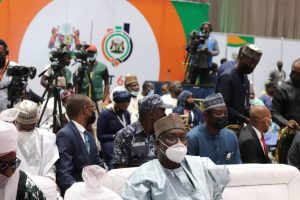https://nigeriabroad.com/wole-soyinka-on-nigeria—it-s-like-something-has-broken-in-society-
Nigeria Abroad
Wole Soyinka is vexed by the state of Nigeria. Barely a day goes by these days without a kidnapping of one sort or another — a politician and his retinue in Niger state; two nurses and a one-year-old baby, among others, from a hospital in Zaria; 140 students at a rural school in northwestern Kaduna state. Bandits — as the disparate gangs of armed men roving the country are colloquially known — have abducted at least 1,200 students since December, with around 200 still missing.
Meanwhile, the Islamist Boko Haram insurgency continues into its 11th year in the north-east and separatist movements burble in the south-east. The scourge of banditry has spread to every corner of the country.
“Even during the civil war, I do not believe that we devalued humanity as much as we do today,” says Soyinka, referring to the 1967-70 war that killed more than 1m Nigerians, during which he was held in solitary confinement for two years — scribbling protest poetry on toilet paper and packs of cigarettes. “It’s like something has broken in society, in something I used to take for granted.”
Soyinka, a lion of African literature, is less voluble in the flesh than he is on the page, where he has spent decades skewering sundry African dictators, despots and authoritarians. We meet at Freedom Park in Lagos, where the slight 87-year-old keeps an office. His voice is soft and plummy; his body smaller in person than his iconic white afro suggests in pictures.
The first writer from the continent to win the Nobel Prize for Literature — in 1986 — Soyinka is principally known for his plays. One of them, 1975’s celebrated Death and the King’s Horseman, is being made into a movie for Netflix by Nigeria’s most powerful film producer, though Soyinka says he hasn’t really thought about it much. “It has no particularly special impact on me; I see it as a work of art, a creative piece which can go anywhere,” he says.
For decades, Soyinka and Chinua Achebe were the main global representatives of Nigerian writing. But over the past decade and a half, a new generation of writers in the diaspora and in Nigeria itself — including Chimamanda Ngozi Adichie and Teju Cole — have taken up the mantle. For all his pessimism about the country — “‘hope’ is an expression that I no longer use”, he says — Soyinka is heartened by the explosion of young Nigerian talent in the arts. He says he keeps a stack of novels by young Nigerian writers in his car for reading during Lagos’s notorious go-slows, though he declines to name any lest he leave someone out…


